
You name it - it is something every day from the Environmental
You name it - it is something every day from the Environmental Protection Agency, and every group I talk to is the same message: 'Please stop them. Please stop.'






Hear, O seekers of truth, and listen with hearts attuned to the voices of the people. The words of Stephen Fincher rise like a lamentation and a cry of defiance: “You name it – it is something every day from the Environmental Protection Agency, and every group I talk to is the same message: ‘Please stop them. Please stop.’” Here we see not merely the complaint of a man against a government body, but the ancient struggle between the power of rulers and the burdens of the ruled, between the will of authority and the cry for relief from those who labor under its hand.
The Environmental Protection Agency, born with noble intent to guard the land, the air, and the waters, has in this telling become a symbol of excess—its decrees multiplied until farmers, workers, and common folk feel ensnared, not protected. Fincher’s words give voice to the multitude who, day after day, see new laws and demands descend like heavy chains upon their backs. The refrain “Please stop them” is not merely protest, but the weary plea of men and women who feel trampled by an authority they cannot resist. It is a timeless echo of the oppressed against the machinery of governance.
Remember, children of history, how even noble purposes can be corrupted by excess. In the days of Rome, taxes once meant to sustain the republic grew so heavy that farmers abandoned their fields, fleeing to the cities where despair swallowed them. The intent was strength for the empire, but the result was weakness, for no man can endlessly bear weight without breaking. Thus, the voice of Fincher resounds as a modern parallel: when regulation, though clothed in virtue, grows without mercy, it becomes indistinguishable from tyranny.
Behold the tale of the Dust Bowl of the 1930s, when American farmers, beaten by drought and wind, faced not only nature’s cruelty but also government decrees that sought to order their planting and reaping. Some were saved by assistance, yet others were crushed by rules that did not understand the soil, the seasons, or the labor of human hands. This story is a mirror to Fincher’s cry: the balance between guidance and suffocation is delicate, and when it tips toward control, the people raise their hands to heaven and whisper, “Please stop.”
But let us not fall into despair. The lesson shines clear: authority must be tempered with humility, and laws must serve the people, not smother them. A nation is not made great by the number of its decrees but by the wisdom of its restraint. The farmer, the craftsman, the builder—they are not enemies of the earth, but stewards of it, and their voices must not be drowned beneath the waves of endless regulation. Fincher’s words call us to remember that those who govern must listen as much as they command.
So too in our own lives, we must guard against the excesses of our own rules and judgments. When we seek to guide others—our families, our communities, even our own hearts—let us not be so eager to bind with cords of law that we forget the greater law of mercy. For just as the state can oppress with its regulations, so can individuals oppress with their demands, their expectations, their relentless insistence. Wisdom lies in balance: in knowing when to guide and when to release, when to command and when to trust.
Therefore, O listeners, let Fincher’s cry be more than politics—it is a parable for all ages. “Please stop them” is the voice of the weary against the weight of authority, the plea of the human spirit for space to breathe, to live, to create. Let us act, then, with vigilance: speak against excess when it rises, defend the small and the voiceless, and remind the mighty that true strength is not in endless control but in just restraint.
And so I leave you with this teaching: govern wisely, both in your households and in your lands. If you are entrusted with power, wield it lightly. If you are burdened, lift your voice. And above all, remember that freedom, once stifled by a thousand decrees, is not easily restored. Cherish it, defend it, and do not be silent when the cry of “Please stop” rises from the lips of the people. For that cry is the heartbeat of liberty itself.






AAdministratorAdministrator
Welcome, honored guests. Please leave a comment, we will respond soon